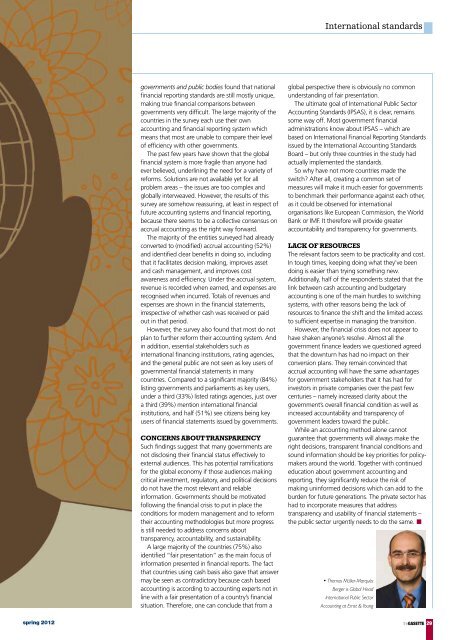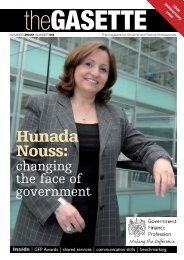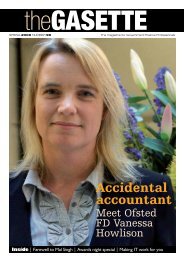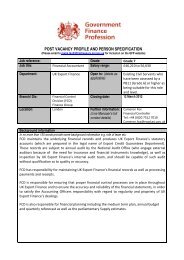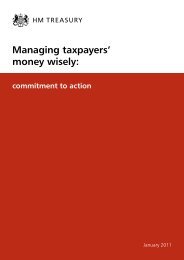Gasette This issue - Government Finance Profession - HM Treasury
Gasette This issue - Government Finance Profession - HM Treasury
Gasette This issue - Government Finance Profession - HM Treasury
You also want an ePaper? Increase the reach of your titles
YUMPU automatically turns print PDFs into web optimized ePapers that Google loves.
International standardsgovernments and public bodies found that nationalfinancial reporting standards are still mostly unique,making true financial comparisons betweengovernments very difficult. The large majority of thecountries in the survey each use their ownaccounting and financial reporting system whichmeans that most are unable to compare their levelof efficiency with other governments.The past few years have shown that the globalfinancial system is more fragile than anyone hadever believed, underlining the need for a variety ofreforms. Solutions are not available yet for allproblem areas – the <strong>issue</strong>s are too complex andglobally interweaved. However, the results of thissurvey are somehow reassuring, at least in respect offuture accounting systems and financial reporting,because there seems to be a collective consensus onaccrual accounting as the right way forward.The majority of the entities surveyed had alreadyconverted to (modified) accrual accounting (52%)and identified clear benefits in doing so, includingthat it facilitates decision making, improves assetand cash management, and improves costawareness and efficiency. Under the accrual system,revenue is recorded when earned, and expenses arerecognised when incurred. Totals of revenues andexpenses are shown in the financial statements,irrespective of whether cash was received or paidout in that period.However, the survey also found that most do notplan to further reform their accounting system. Andin addition, essential stakeholders such asinternational financing institutions, rating agencies,and the general public are not seen as key users ofgovernmental financial statements in manycountries. Compared to a significant majority (84%)listing governments and parliaments as key users,under a third (33%) listed ratings agencies, just overa third (39%) mention international financialinstitutions, and half (51%) see citizens being keyusers of financial statements <strong>issue</strong>d by governments.CONCERNS ABOUT TRANSPARENCYSuch findings suggest that many governments arenot disclosing their financial status effectively toexternal audiences. <strong>This</strong> has potential ramificationsfor the global economy if those audiences makingcritical investment, regulatory, and political decisionsdo not have the most relevant and reliableinformation. <strong>Government</strong>s should be motivatedfollowing the financial crisis to put in place theconditions for modern management and to reformtheir accounting methodologies but more progressis still needed to address concerns abouttransparency, accountability, and sustainability.A large majority of the countries (75%) alsoidentified “fair presentation” as the main focus ofinformation presented in financial reports. The factthat countries using cash basis also gave that answermay be seen as contradictory because cash basedaccounting is according to accounting experts not inline with a fair presentation of a country’s financialsituation. Therefore, one can conclude that from aglobal perspective there is obviously no commonunderstanding of fair presentation.The ultimate goal of International Public SectorAccounting Standards (IPSAS), it is clear, remainssome way off. Most government financialadministrations know about IPSAS – which arebased on International Financial Reporting Standards<strong>issue</strong>d by the International Accounting StandardsBoard – but only three countries in the study hadactually implemented the standards.So why have not more countries made theswitch? After all, creating a common set ofmeasures will make it much easier for governmentsto benchmark their performance against each other,as it could be observed for internationalorganisations like European Commission, the WorldBank or IMF. It therefore will provide greateraccountability and transparency for governments.LACK OF RESOURCESThe relevant factors seem to be practicality and cost.In tough times, keeping doing what they’ve beendoing is easier than trying something new.Additionally, half of the respondents stated that thelink between cash accounting and budgetaryaccounting is one of the main hurdles to switchingsystems, with other reasons being the lack ofresources to finance the shift and the limited accessto sufficient expertise in managing the transition.However, the financial crisis does not appear tohave shaken anyone’s resolve. Almost all thegovernment finance leaders we questioned agreedthat the downturn has had no impact on theirconversion plans. They remain convinced thataccrual accounting will have the same advantagesfor government stakeholders that it has had forinvestors in private companies over the past fewcenturies – namely increased clarity about thegovernment’s overall financial condition as well asincreased accountability and transparency ofgovernment leaders toward the public.While an accounting method alone cannotguarantee that governments will always make theright decisions, transparent financial conditions andsound information should be key priorities for policymakersaround the world. Together with continuededucation about government accounting andreporting, they significantly reduce the risk ofmaking uninformed decisions which can add to theburden for future generations. The private sector hashad to incorporate measures that addresstransparency and usability of financial statements –the public sector urgently needs to do the same.• Thomas Müller-MarquésBerger is Global HeadInternational Public SectorAccounting at Ernst & Youngspring 2012theGASETTE 29


